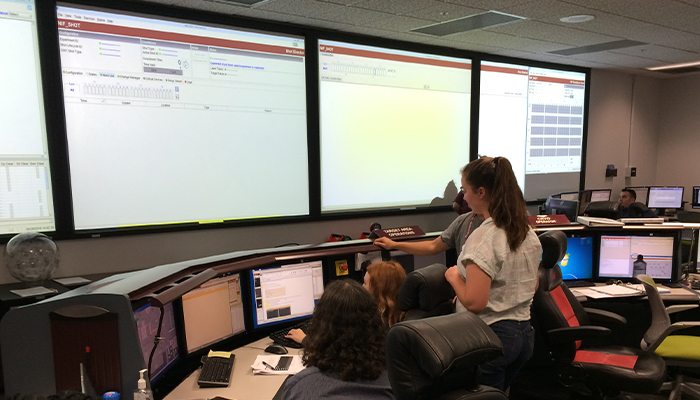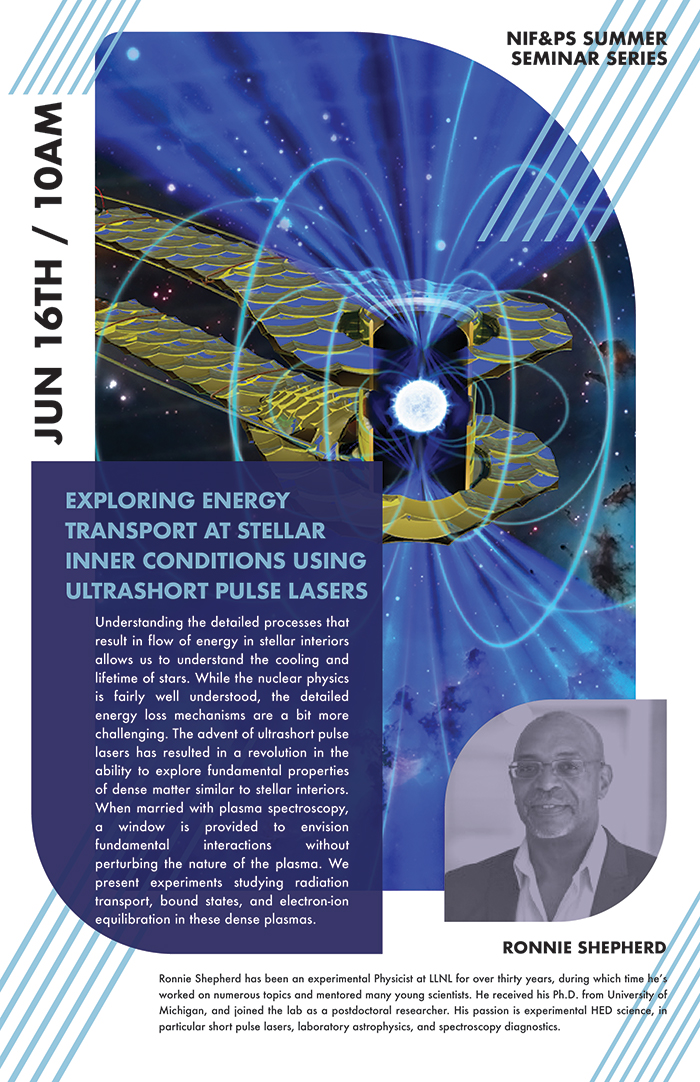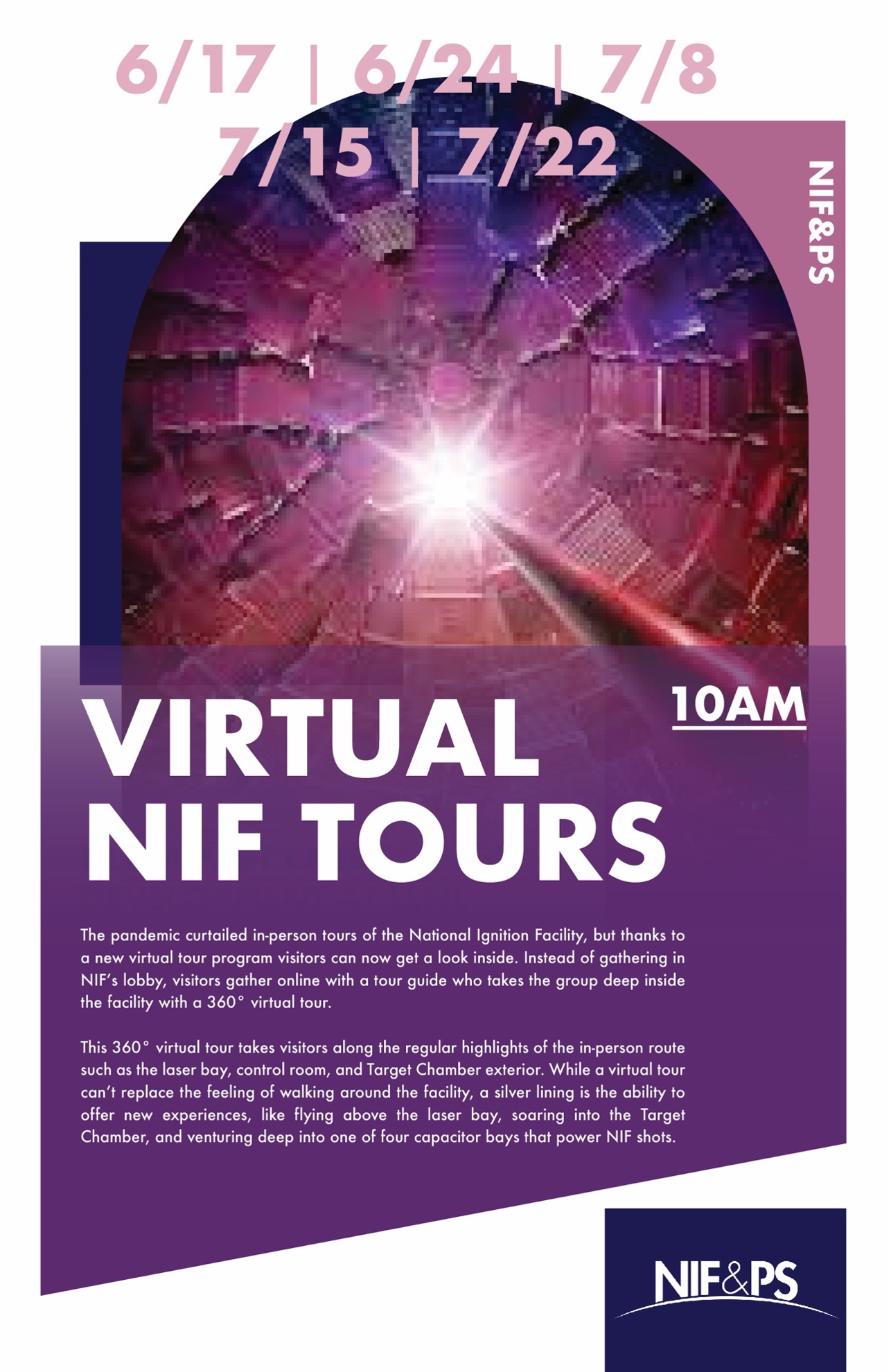Virtual NIF&PS Summer Scholar Program Returned with Expanded Format
August 31, 2021
 Evelyn Andrade (standing), a NIF&PS Summer Scholar Program intern, is in her fourth summer at LLNL. She is shown in the middle in the NIF Control Room during her first summer in 2018. Credit: Evelyn Andrade
Evelyn Andrade (standing), a NIF&PS Summer Scholar Program intern, is in her fourth summer at LLNL. She is shown in the middle in the NIF Control Room during her first summer in 2018. Credit: Evelyn Andrade The NIF&PS virtual Summer Scholar Program returned for another year with an expanded lineup of seminars, coffee talks, and virtual tours.
Call it the new and improved Summer Scholar Program 2.0.
Last year, LLNL organizers didn’t even know whether there would be an internship program because of the COVID-19 pandemic. The timing of the Lab’s shutdown in March caught organizers in the middle of planning for events and pairing students with mentors. Once the decision was made to continue with an online program, the team had to quickly pivot and transition to an agenda of remote events.
“This time, things were planned and we had more preparation,” said Summer Scholar Program Director Patrick Poole. “We’ve expanded on the things that worked well. Definitely having some lead time, and it being virtual again was really a huge benefit to making sure we have a strong program again.”
The scholar program, which runs about 10 weeks, includes about 80 students. The program offers experimental, theoretical, and computational research in disciplines including lasers, plasma physics, electro-optics, software development, optics development, and material science.

As in 2020, in lieu of actual field trips, the program has set up weekly seminars on NIF&PS research, including presentations by Dan Clark on NIF implosion performance; Michael Stadermann on targets, the central component of all NIF experiments, and Target Fabrication; and NIF&PS Principal Associate Director Jeff Wisoff on his experiences as a NASA astronaut and his vision for the future of the space program.
The biweekly informal coffee talks feature a wide range of NIF&PS staff members discussing their paths to the Lab, career opportunities, and what it’s like to work at LLNL. The roster this year includes an experimental physicist, an integration manager, a chief engineer, a software engineer, and the deputy director of the HED Science Center, Félicie Albert.
Poole said the scholar team decided to increase the number of coffee talks after receiving feedback from students, some of whom wanted more informal, social events to interact with other students remotely.
“The coffee series is an example of a thing that kind of blossoms in a virtual sense and that we’ve expanded upon this year,” Poole said. “It was difficult to give the students a sense of community because they’re not at the Lab. There’s a disconnect. We found that while the seminars are useful, they were missing the in-person aspects and that the coffee series was a good way to bring a more informal interaction.”
This year’s Bay Area tours have been expanded and kicked off in June with a virtual tour of NASA’s Goddard Space Flight Center. The lineup includes the LLNL’s Advanced Manufacturing Laboratory and Lawrence Berkeley National Laboratory as well as the NIF virtual tour. The NIF tour gives the students a view of a laser bay, the Control Room, and the Target Chamber—a much closer look at the facility than possible in an in-person visit.
The year-end poster contest will again be part of a “Research Slam,” a series of brief presentations held before a panel of judges via teleconference. Organizers also put together a scavenger hunt for the students.
Poole, NIF&PS Summer Scholar Administrator Alida Bevill, and Zhi Liao, who oversees the program, cited the Lab’s summer internship team for “thinking outside the box” and expanding the list of seminar speakers.
LLNL staff scientist Dave Schlossberg, seminar coordinator for the Summer Scholar Program, praised the key team, including Poole and Bevill, for actively seeking feedback and for making improvements in real time.
He said students are excited and intrigued by the work being done at LLNL, NIF&PS and, in particular, the Joint High Energy Density Science (JHEDS) program.

Students who were contacted all had high marks for the summer program, their mentors, and the Lab community, and their experience.
James Brutus, an Air Force ROTC intern with NIF&PS, is working on a plasma optics project, helping run simulations that test the influence plasma gratings can have on the propagation of light waves that pass through them. The hope is that these simulations can be recreated in experiments to supplement traditional solid-state optics.
“I’ve been taken aback by how intelligent the team I am working with is,” said Brutus, a senior studying photonics sciences and engineering at the University of Central Florida. “I’ve been surprised by all the seminars and events that are made available to keep virtual interns engaged during their time of employment at the Lab.”
Jamal Johnson said he’s found the experience to be “both rigorous and highly educational.” Johnson is a newcomer to the summer intern program.
“LLNL is the third lab I’ve interned at since beginning my physics undergrad education,” he said, “and I’ve found the level of commitment to education to be exceptional.”
Johnson is working in the Dense Plasma Focus (DPF) group. His project is to understand the pinch-formation process in a DPF when operating with deuterium-tritium gas mixtures. For this work, he is running kinetic plasma simulations using the particle-in-cell (PIC) code Chicago.
Johnson will enroll at the Massachusetts Institute of Technology in the fall as a Ph.D. student in nuclear science and engineering.
Evelyn Andrade, who is entering her fourth summer at the Lab, has experienced both onsite and remote internships. She praised the program and said the online social networking dynamic has improved this year with many opportunities to meet other interns.
“Overall, the Summer Scholars Program has been amazing, both in-person and virtually,” said Andrade, who works in Laser Systems Engineering Operations and is an undergrad at Saint Michael’s College in Vermont, majoring in chemistry. “It has provided me with so many role models and mentors that I can bounce ideas off of or even just talk about my career choices.”
Andrade has been working on Target Alignment Assistant Tool (TAAT) scripting for the Alignment Team during her internship. TAAT scripts are spreadsheet-based and help to automate and streamline alignment processes. Each summer she has worked on a different script, completing specification documents and commissioning documents as needed.
Poole and Bevill said they would like the online summer program to continue next year in some format, even if the program returns to the Lab campus. Poole noted that the virtual nature “is a unique opportunity” for students who aren’t able to travel.
Along with Poole, Bevill, Liao, and Schlossberg, the NIF&PS Summer Scholar Team members are Reggie Drachenberg, program evaluator/poster symposium; Rajesh Raman and Tom Braun, offsite tour coordinators; Matthew Edwards, seminar coordinator; Bela Patel and Sam Schrauth, discussion panel coordinators; Danyelle Asbe, administrative support; Tris Sunardi, scavenger hunt; and James Wickboldt, mass media coordinator.
Braun, Edwards, Schlossberg, Patel, and Asbe are new to the team this year.
Bevill also cited the contributions from Mary Orrett and Jason Laurea of NIF&PS for their work on the new, improved internal and external Summer Scholar websites.
—Jon Kawamoto
Follow us on Twitter: @lasers_llnl



